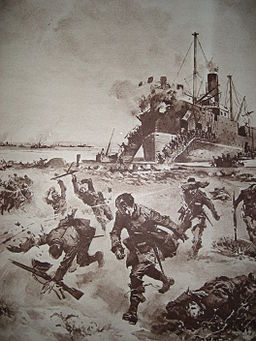Good generals let their soldiers die in vain
In November 1914 Winston Churchill proposed a campaign to turn the tide of war on the Eastern Front. The plan was to fight a land war up the Gallipoli peninsula, secure safe passage for warships up the Dardanelles, and give the Russians access to the Mediterranean.

The land war was a total failure. After landing in April 1915 the Allied troops lost momentum quickly. By August Ottoman forces had tied them into static trench warfare. The Allies couldn’t make any more progress, they had achieved nothing and 220,000 soldiers had died. It was at this point that the allied troops were ordered to evacuate.
Some soldiers said they hoped their dead comrades wouldn’t notice them leaving. The 220,00 soldiers died “in vain”. And yet it was a great decision by Lieutenant-General Sir Charles Monro to let them die in vain. Better that than lose even more men pointlessly.
Why is it so clear to everyone than soldiers dying in vain is more tragic than soldiers dying otherwise? Why is it so hard to accept that Monro made the right decision?
The sunk cost bias
The “sunk cost bias” is the tendency to keep doing something that doesn’t make sense anymore, just because of how much you’ve already paid for it. When that cost is as enormous as people’s deaths this bias is overpowering. It would be the obvious thing to do to refuse to fight an unwinnable battle. But we feel that it’s a mistake, or even immoral, to turn away from the same fight when people have already died.
The sunk cost bias is very stubborn. History is filled with stories of generals not as wise as Monro. Generals who refused to let the deaths of their soldiers be in vain and fought on regardless of the odds. These generals are almost always on the losing side, and they take far more men to the grave with them than could ever be justified. And yet this temptation is still strong. That strength of feeling is due to the power of sunk costs.
Sadly for soldiers everywhere many of the ways you might expect to fight sunk costs wouldn’t work:
- Folk psychology is aware of it, but even after advice to “cut your losses” and “not throw good money after bad” we still act according to this bias.
- The evidence doesn’t suggest that simply thinking very hard about the decision will help.1
- It doesn’t seem like talking it over with other people will help.2
- It isn’t even clear that knowing about the sunk cost bias will help very much.3
The Battle of Gallipoli was unwinnable. Luckily the battle against sunk costs is not. Next time we’ll look at how sunk costs bias impacts on career choice and how you can overcome it.
References
- Simonson & Nye 1992 ↩
- Bornstein & Chapman (1995): “When responsibility is manipulated by varying whether the present decision maker or someone else made the usually hypothetical initial investment, the decision maker’s decision to continue or switch is affected (e.g., Staw, 1976; Staw & Ross, 1987; Whyte, 1993); but when responsibility is manipulated by varying the participant’s perspective (i.e., whether the present decision maker is the participant or a third party), it has less or no effect Arkes & Blumer, 1985” ↩
- The evidence is mixed. Economics professors are good at avoiding the sunk cost bias Larrick, Morgan, and Nisbett (1990), as are people who have taken a lot of courses in business administration and accountancy Fennema & Perkins (2008). But simply having more business experience doesn’t help [ibid.]((http://www.gwern.net/docs/2008-fennema.pdf), nor do economics courses Arkes and Blumer (1985), Larrick, Nisbett, and Morgan (1993) ↩